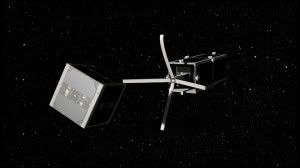Finally the Swiss have put down their watches and they are now entering the field of science once again. Currently space researchers within the small European state are seeking funds to build a spacecraft which can grab pieces of space garbage and drag them down into the atmosphere so it automatically burns up in a colossal ball of fire.

So far the researchers at the Swiss Space Centre of École Polytechnique Fédérale de Lausanne have been working on their master plan for three years, according to the director Volker Gass. They have the technology, they are seeking the funds, and they have their first possible target of a picosatellite named ‘SwissCube’ which was launched back in 2009.
The only problem is that to build the spacecraft, which has been prematurely named as ‘CleanSpaceOne’, will require a whopping $11 million to create and then another three to five years until launch. Clearly there is no austerity in Switzerland then!
Even though it sounds crazy, something does have to be done as space rubbish is becoming a large problem for humanity as more and more fragments of our junk is now heading back towards earth or coming into contact with some of our existing space structures. At the moment NASA is tracking 16,000 objects which are larger than 10cm, and that’s not forgetting the numerous smaller objects which could easily kill someone if they didn’t burn up whilst re-entering our atmosphere.
The new spacecraft will be used to remove larger pieces of space debris which are causing problems for astronauts. The Swiss space module will use a semi-automatic probe and a highly-technical guidance system to latch on to targets which could be travelling at speeds of up to 28,000 km/h, before its ion microthrusters will bring the craft alongside it. And that’s when the Swiss gripper will cuddle the object like a murderous Swiss octopus before the object’s final fiery destruction.
This all sounds pretty simple when it’s written down in front of you, however there are other problems which Gass outlines. The main problems, according to Gass, is that once the piece of debris has been snagged the combination of debris and craft will then have a different centre of gravity which could cause it to spin out of control. In order to survive, the probe will have to be able to stabilise itself so it can guide itself back on to the atmosphere’s curve.
The final result, Gass hopes, is that there will be a number of these craft which can act as a battalion of space maids, however at the rate we release garbage it’s doubtful that they would be able to keep up. If we can’t clean our own planet then how are we going to clean space? But, hey, maybe we can send it on to someone else instead in the true human spirit?
